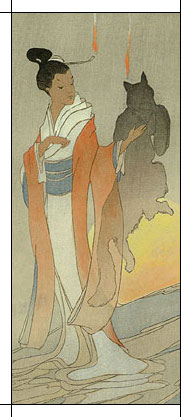
|
+ |
|
|
+ |
|
|
+ |
|
|
Western |
+ |
|
Vulpines |
+ |
|
+ |
|
|
+ |
|
|
That's not what they meant... |
+ |
|
Graves, roofs, and your own living room |
+ |
|
+ |
|
|
Where next? |
+ |
|
|
|

Chinese Fox StoriesFolktales Stories from Ji Yun The
False Concubine The richest source of Chinese fox stories on the web. I have given up listing them here because the webmaster adds to them so rapidly. Stories from Pu Songling's Liaozhai Zhiyi Miss
Lien-Hsiang Hong-Yu
the Fox Fairy Foxtrot's Collection of Kitsune Lore Story: The Farmer Walthall, Anne. Peasant Uprisings: A Critical Anthology of Peasant Histories. Chicago: University of Chicago Press, 1991. [find it] Foxes are connected with late Edo peasant uprisings as a symbol of social change, as in "A Tale of a Dream from the Fox Woman Plain," pp. 169-92. Novels Chinese novels bear the same relation to Chinese folklore as Victorian fantasy novels bear to English fairy lore: The folklore is the raw material, to be embroidered and embellished as the writer pleases. Folklore tends to view foxes (or fairies) from the outside; the fox is clearly the Other, understood only through what it does and says in front of humans. The folklorist's understanding of the fox is shaped by common beliefs about what foxes are really like, and the story is often meant to teach its listeners what to do when they meet a real fox spirit.The novelist, on the other hand, is free to veer away from the strict, "realistic" interpretation of the fox and to reshape his or her interpretation of the fox to fit the theme of the novel. Novels often give the fox's side of the story. And, just as in Victorian fantastic literature, the novelist's conception of the fox may bear no resemblance at all to the "real" foxes which peasants fear to meet in the field. However, one generation's embellished fantasy is the next generation's canon, making Chinese novels about foxes a rich source of foxlore. Feng Menglong. Ping Yao Zhuan: The Sorcerors' Revolt. Translated by Nathan Sturman. A 17th-century Chinese novel chronicling, among other things, the adventures of the fox Holy Auntie and her foolish children Hu Chu and Hu Mei (or Hu Mei'r). The stories of several other foxes are woven into the story, along with a great deal of information about foxlore in general. Ping Yao Zhuan is remarkable because unlike folk stories about foxes, the novel is told from the foxes' point of view; we see them in their den, laying plans, traveling cross-country in search of enlightenment (or drink, or a rich marriage), weighing their choices, and becoming characters as fully-fleshed as the humans around them. A quick, entertaining, and most enlightening read. |